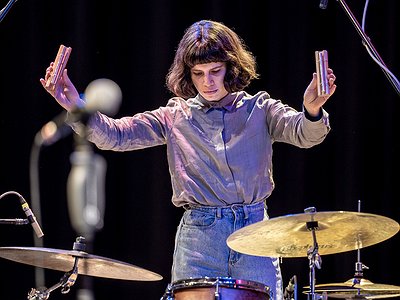Name: Mariá Portugal
Occupation: Drummer, singer, composer, producer
Nationality: Brazilian
Current release: Mariá Portugal's EROSÃO is out via Fun In The Church.
If you enjoyed this interview with Mariá Portugal, visit her official homepage for everything you ever wanted to know about her. She is also on Instagram, Soundcloud, twitter, and Facebook.
Tell me about your instrument and/or tools, please. How would you describe the relationship with it? What are its most important qualities and how do they influence the musical results and your own performance?
My main instruments are the drum kit and the computer, and my experience with the former feeds the experience with the latter, and vice-versa.
I love the control and the detailism of manipulating sounds digitally. I also love that it's not a heavy thing to carry. And I love how it's easy to build gestures and flows of sound on drums. I also love that it doesn't need power or amplification to work.
What do improvisation and composition mean to you and what, to you, are their respective merits?
For me they are basically the same thing.
The relationship with time is what makes both radically different experiences, which can lead to different results - not always, though. Improvised music and composed music can also be pretty indistinguishable.
Derek Bailey defined improvising as the search for material which is endlessly transformable. Regardless of whether or not you agree with his perspective, what kind of materials have turned to be particularly transformable and stimulating for you?
Every sound material is transformable. Transformation actually is an inner quality of the sound itself. And I think improvisation is a great tool to open our ears for that characteristic and use it to create music.
Purportedly, John Stevens of the Spontaneous Music Ensemble had two basic rules to playing in his ensemble: (1) If you can't hear another musician, you're playing too loud, and (2) if the music you're producing doesn't regularly relate to what you're hearing others create, why be in the group. What's your perspective on this statement and how, more generally, does playing in a group compare to a solo situation?
I agree 100% with (1) - but sometimes you just want to play too loud. That's a truism for drummers; we can always be louder than everybody else, and sometimes it makes a lot of sense- but usually not for long.
With (2) I agree 200%.To me, improvisation is fundamentally an act of hearing.
There are many descriptions of the ideal state of mind for being creative. What is it like for you? What supports this ideal state of mind for yiur improvisations and what are distractions? Are there strategies to enter into this state more easily?
That's indeed a marvellous state to experience, and it has happened to me both in composition and improvisation.
I think it's a very similar state to that of children playing. When we lose it, to focus on listening to your colleagues is always a good thing to do.
Can you talk about how your decision process works in a live setting?
That's a very hard question! It depends on so many factors. The environment, the other musicians, the audience, my state of mind. I sincerely don't know how it works.
How do you see the relationship between sound, space and performance and what are some of your strategies and approaches of working with them?
I strongly believe this separation between sound, space and performance is an illusion.
The concept of sound as something "purified" from the matter (either space or body) still lingers like a curse in most of Occidental music practice. Maybe it made sense here some centuries ago, but I have the impression that it doesn't contribute to anything really interesting nowadays.
How is playing live in front of an audience and in the studio connected? What do you achieve and draw from each experience personally?
To play for an audience is something irreplaceable, because I believe the audience is always creating the music together with us.
In the studio it's an imagined audience, or maybe it's only ourselves playing both roles at the same time. I love both the stage and the studio, and I am actually enjoying making something completely different on stage than I did on my album EROSÃO.
Can you talk about a breakthrough work, event or performance in your career? Why does it feel special to you? When, why and how did you start working on it, what were some of the motivations and ideas behind it?
When I joined Arrigo Barnabé's band to make a new version of his classic album Clara Crocodilo, which is the album that I would take to the desert island, if I could choose only one.
Besides the music itself, the band was also unbelievably good, much better musicians than myself. They taught me a lot and also gave me the freedom to improvise. After that experience my artistic path really took another direction.
In a way, improvisations remind us of the transitory nature of life. What, do you feel, can music express about life and death which words alone may not?
I believe music can be a direct metaphor of our bodily experience within space. Concepts such as weight, velocity, height, density, intensity, inertia, texture, mass etc. are fundamental to our building of meaning within this world since we are babies.
Music, especially music focused on the quality of sound itself, can manipulate these concepts directly.




